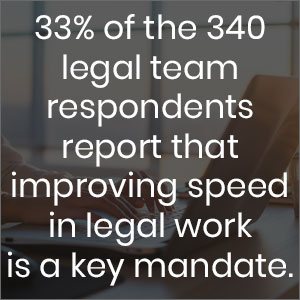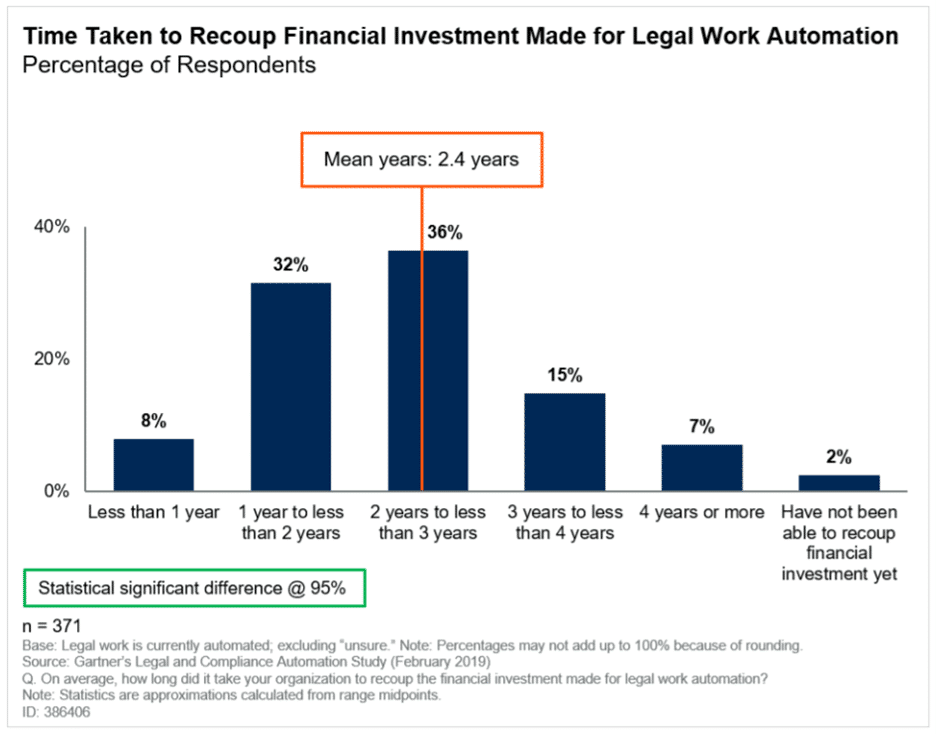Just a few months ago, Gartner published some brilliant research about how legal tech and automation can help the legal profession. Although not expressly discussing contract lifecycle management (CLM) or contract management solutions (CMS), the research points out how the corporate law practice has to adapt to automation, hitting on the theme of ‘more for less.’
Consider two key statistics. First, over 33 percent of the 340 in-house legal team respondents report that increasing speed in legal work is their key mandate. That’s definitely an indicator of the need for legal automation. The second key statistic suggested that the automation of legal tasks and processes is generally quite fruitful. Gartner revealed that 42 percent of respondents mentioned that their legal technology automation resulted in a greater than expected return on investment (ROI).
SPEED IN LEGAL JOBS: LEGAL AUTOMATION PAYS
Given that speed is key to so many corporate legal teams, the study led by Gartner Research Director Jim Murphy showed impressive results. About one-quarter of respondents experienced speed improvements over 50 percent after automating some aspects of their practices. Murphy notes that in some cases, this level even exceeded 90 percent.
In this regard, contract management software is one of the tools that can help you achieve the same results. One part of managing contracts is the ability to automate tasks, like standard contract generation. Quite often, creating a basic agreement is a tedious part of the contracting process. It can be time-consuming, too.33% of the 340 legal team respondents report that improving speed in legal work is a key mandate.
AUTO-CONTRACT DESK EXAMPLE
The beauty of advanced automation in a CLM, like an Auto Contract Desk (ACD) feature, is that it takes mundane work away from corporate attorneys. You don’t need an ROI calculator or degree from a notable school of law to understand how this provides a solid return. As an 
This information allows the general counsel or legal team to scan their own T&Cs to figure out which are most common. Then, they can focus on standardizing and blessing certain T&Cs, which can go into the contract automation template.
Now, when a sales representative, for example, needs a standard sales contract, they can answer a series of questions before the standard contract is generated automatically.
WHY AUTOMATION IS GREAT
This means that with a standard contract, the corporate attorneys no longer have to get involved. So not only does the sales rep in the above example receive their contract faster, but there is one less tedious task on the corporate attorney’s desk. This also means that legal counsels’ time can be more effectively used on higher value-add projects. For instance, rather than sending so many case files to outsourced law firms, they can bring some of these projects in-house.
This straightforward example shows how legal automation pays and can truly be beneficial. And, makes a strong case for a contract automation ROI.
NAILING THE ‘CONTRACT AUTOMATION ROI’ CASE
If the ROI of contract management is still not clear, the Gartner research certainly clarifies it. More specifically, the research states that “good things almost always come to those who choose to automate legal and compliance workflows.” The study also found that:
- 89 percent reported that legal automation met or exceeded their expected ROI
- 42 percent declared that automation exceeded their expected ROI
- Only 6 percent reported that automation provided less ROI than expected
Good things come to those who choose to automate legal and compliance workflows. In fact, the research showed that the average time to recuperate the financial investments in legal work automation is about two and a half years. Sixty-eight percent of the respondents showed a payback timeframe between one to three years.
From a contract automation ROI perspective, our Contract Management Primer provides a solid back-of-the-envelope calculation. Take a look at this simple calculation that can be applied to your own organization and legal team. It will give you a rough idea of whether your team could experience a positive ROI by bringing on a CMS.
WILLINGNESS TO INVEST
If you were looking for a surprise, one exists in this report! Murphy found that, “business leaders are remarkably open to investment in legal automation- 73 percent of executives are very open or extremely open.” In fact, CEOs said that legal automation pays off because it supports aligning the legal team with the business’s priorities and critical initiatives.
LEGAL AUTOMATION PAYS
Ultimately, the research highlights the fact that legal automation pays off. As such, contract automation in a powerful CLM makes this payoff even more real. Best of all, it will help your legal team to work less on the mundane and focus more on those high-value projects.
It comes down to you, the general counsel. You have the responsibility of leading your legal team well into the modern age. As recent global crises have shown us, organizations need robust, automated processes. Set aside the instinctive risk aversion for a moment. Partner, instead, with a good CLM vendor – one that will work with you on your legal digital transformation.
Connect with us today to find out how ContractPodAi can help here – and watch your own legal automation pay off.
Author:

Charles Dimov
Connect with us on Linkedin









